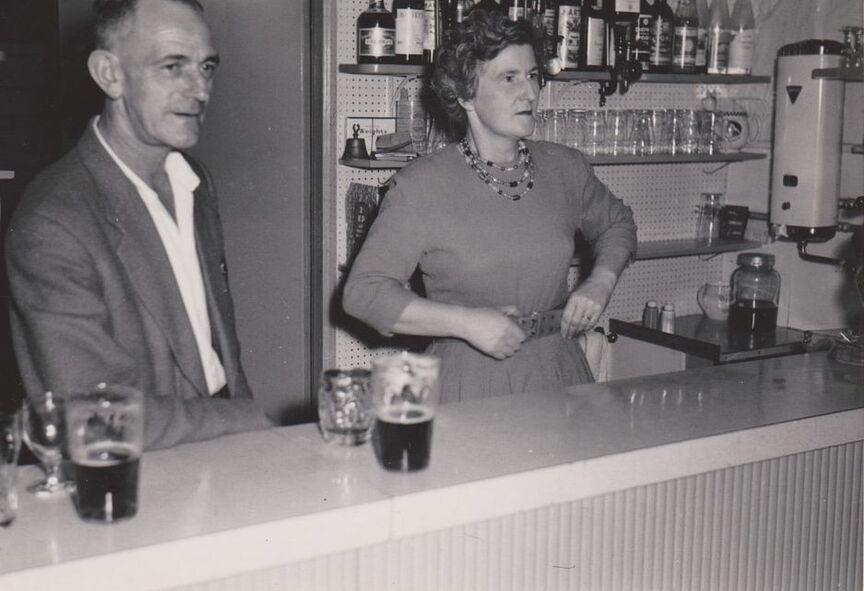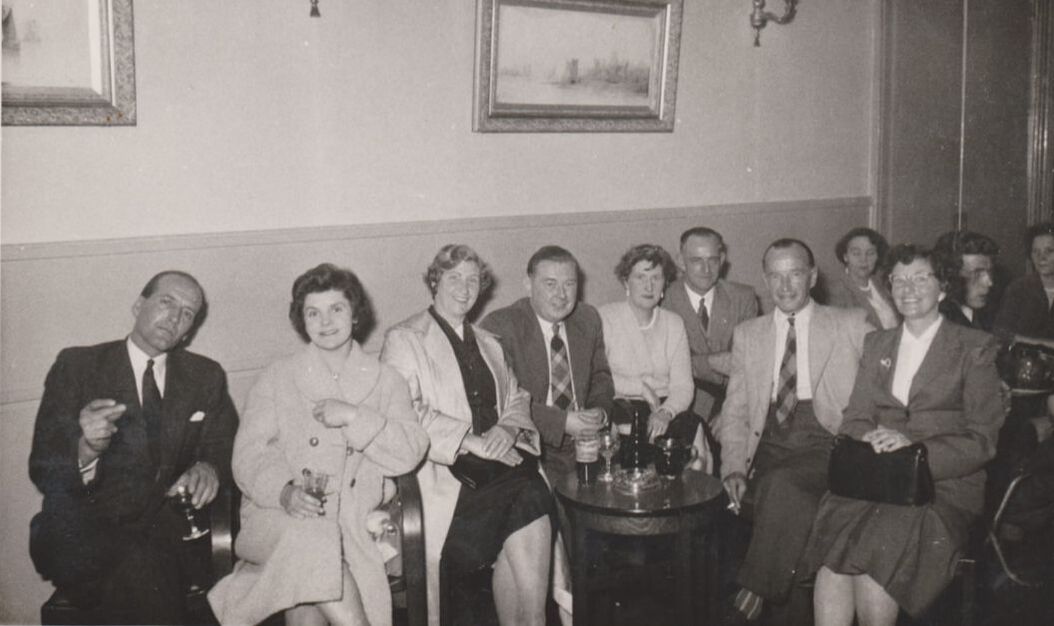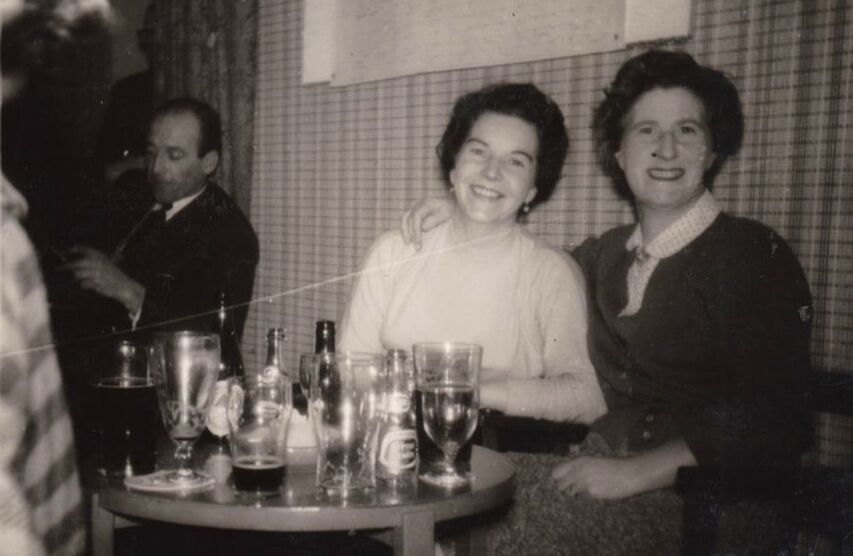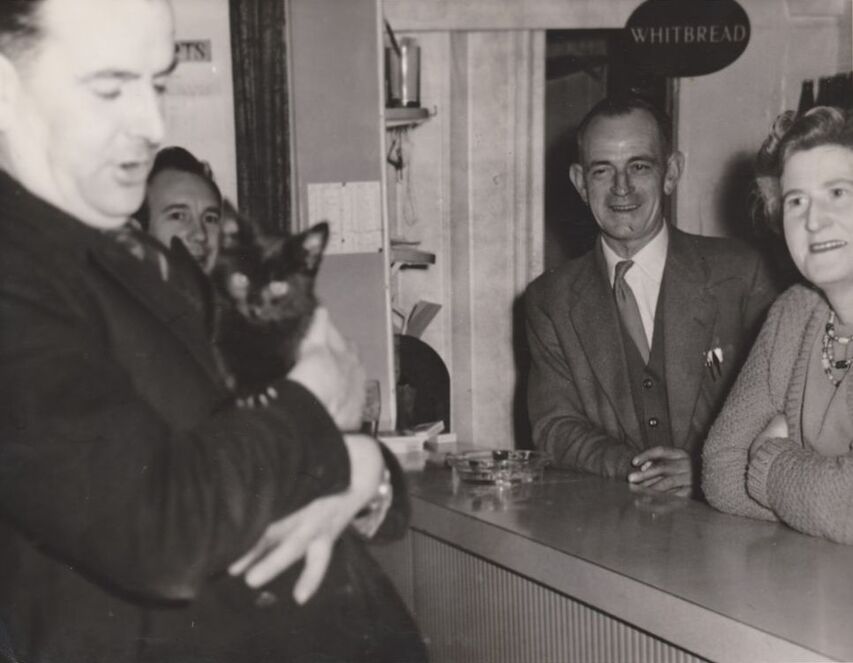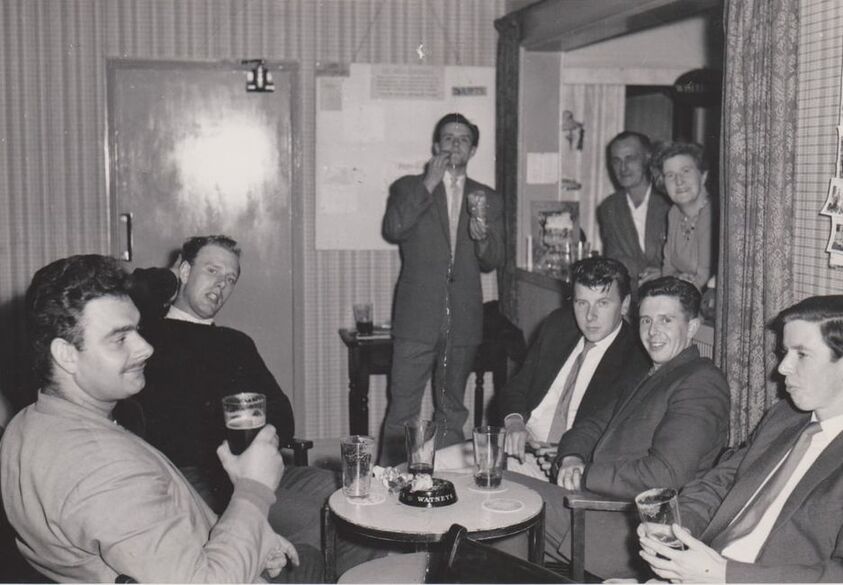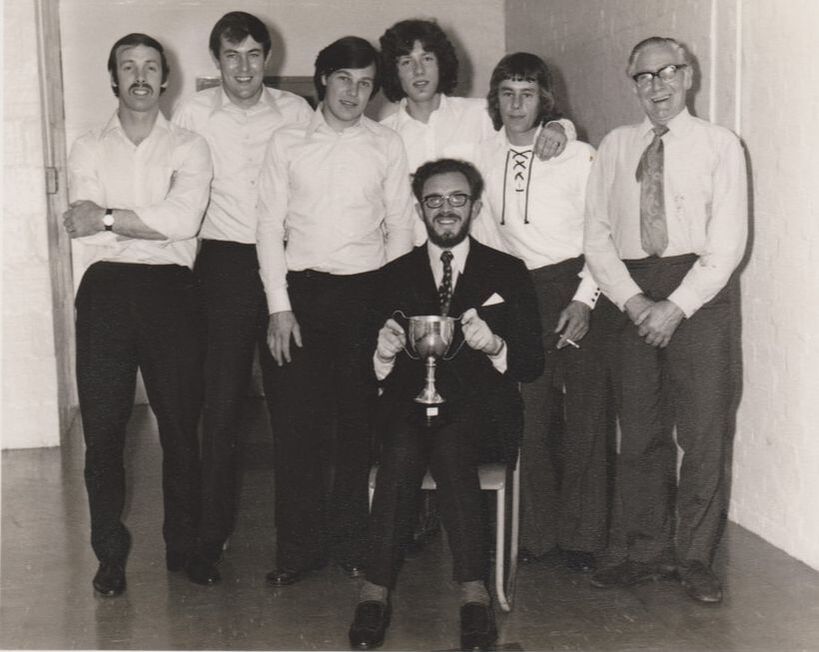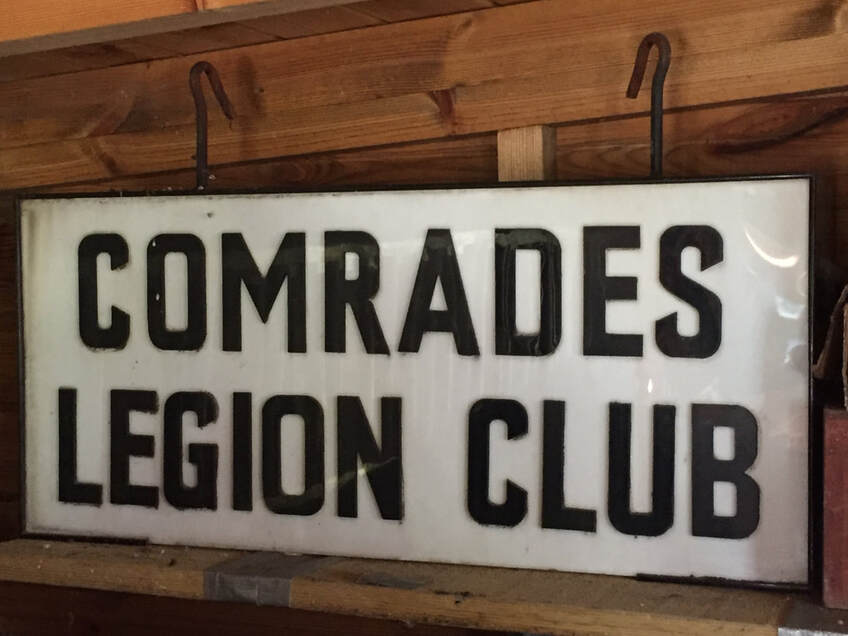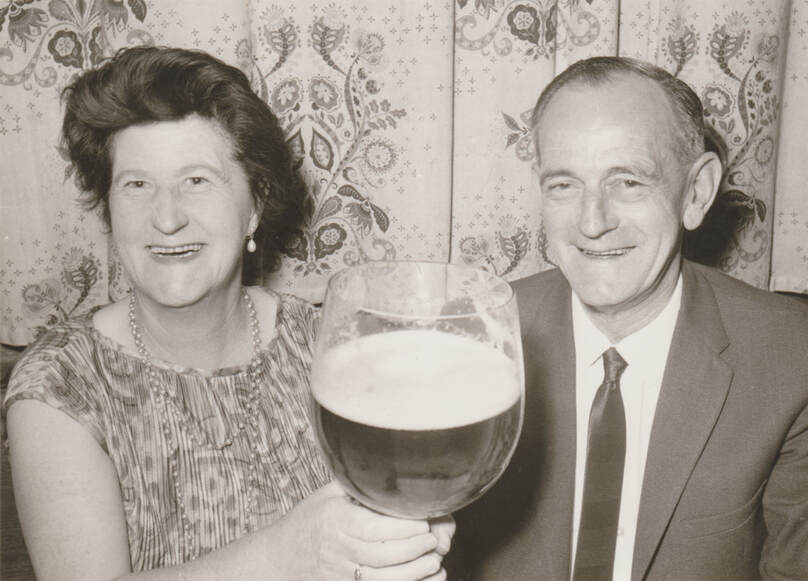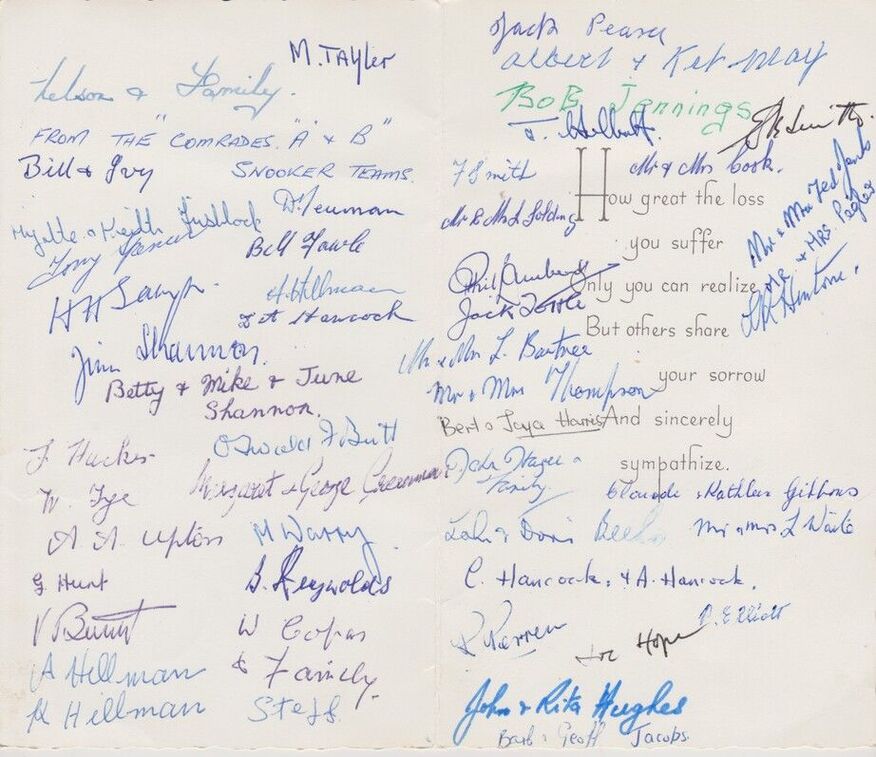Life at Comrades Club John Currant February 2023
My parents Olive and Arthur (Sonny) Currant as villagers might recall them in the Comrades Club during the 1960s and 70s (courtesy John Currant)
My parents, known in the village as Sonny and Olive Currant, ran the Comrades Club in Box from 1958 until the early 1970s before my father died in 1973. The building had a chequered history, originally a grocer’s shop called Alpha House run by
John Hardy, then acquired for servicemen under the name the Comrades Legion Club, and it is now a private residence called Hardy House.
The Club provided my parents with a home and work (as steward and cleaner), as well as a very active social life. The Currant family were well-known having lived in the village for generations and they were welcomed to bring in trade and to run the club in an appropriate way after the death of long-serving steward Bill Hemmings on 20 December 1957. For a few years, Sonny was able to continue working on the railways during the daytime, running the Comrades at night. Olive came from Wales and not from a Box family but she was widely recognised locally because of her jobs and her involvement in various local clubs and institutions. She worked in the factory owned at one time by Ross Frozen Foods in The Ley, and as housekeeper for Dr Davey at Ashley Croft. She ended up working at Copenacre for The Admiralty until her retirement.
In May 1965 an agreement was drawn up between Albert Edward May (the Club secretary) and my father that he should be paid £5 per week for his employment with responsibility for the Club's premises, stocks of alcohol and cash takings.[1] The steward could be dismissed with 14 days' notice for dishonesty, insobriety, insubordination or other misconduct and had to place a security deposit of £100 with the committee.
John Hardy, then acquired for servicemen under the name the Comrades Legion Club, and it is now a private residence called Hardy House.
The Club provided my parents with a home and work (as steward and cleaner), as well as a very active social life. The Currant family were well-known having lived in the village for generations and they were welcomed to bring in trade and to run the club in an appropriate way after the death of long-serving steward Bill Hemmings on 20 December 1957. For a few years, Sonny was able to continue working on the railways during the daytime, running the Comrades at night. Olive came from Wales and not from a Box family but she was widely recognised locally because of her jobs and her involvement in various local clubs and institutions. She worked in the factory owned at one time by Ross Frozen Foods in The Ley, and as housekeeper for Dr Davey at Ashley Croft. She ended up working at Copenacre for The Admiralty until her retirement.
In May 1965 an agreement was drawn up between Albert Edward May (the Club secretary) and my father that he should be paid £5 per week for his employment with responsibility for the Club's premises, stocks of alcohol and cash takings.[1] The steward could be dismissed with 14 days' notice for dishonesty, insobriety, insubordination or other misconduct and had to place a security deposit of £100 with the committee.
Purpose of the Club
The Comrades Legion Club seems something of an anachronism in our modern world. It was envisaged to provide a relaxed, social atmosphere for men who had served in the First and Second World Wars, where they could enjoy mutual helpfulness, mental and moral improvement, and rational recreation.[2]
It was a democratic organisation with each member entitled to a single voting share. Ex-servicemen were required to declare their last army regiment or naval ship. Membership wasn’t restricted to First and Second World Wat veterans, however, and all servicemen over 18 years of age, the widows of members and eligible non-servicemen were catered for in the rules. An annual subscription was payable by members of 2s.6d in 1921 (today worth £6) and was only 4s (today £4) by 1965.[3] Members not paying for two months were deleted from the list of members. The 12-strong management committee had wide powers to reject the applications of unsuitable persons and, somewhat sinisterly, provision was made for members becoming insane. This seems a strange provision but was probably based on the memory of how trauma had affected Great War veterans.
The Comrades Legion Club seems something of an anachronism in our modern world. It was envisaged to provide a relaxed, social atmosphere for men who had served in the First and Second World Wars, where they could enjoy mutual helpfulness, mental and moral improvement, and rational recreation.[2]
It was a democratic organisation with each member entitled to a single voting share. Ex-servicemen were required to declare their last army regiment or naval ship. Membership wasn’t restricted to First and Second World Wat veterans, however, and all servicemen over 18 years of age, the widows of members and eligible non-servicemen were catered for in the rules. An annual subscription was payable by members of 2s.6d in 1921 (today worth £6) and was only 4s (today £4) by 1965.[3] Members not paying for two months were deleted from the list of members. The 12-strong management committee had wide powers to reject the applications of unsuitable persons and, somewhat sinisterly, provision was made for members becoming insane. This seems a strange provision but was probably based on the memory of how trauma had affected Great War veterans.
By the mid-1960s a new rule book was issued with the sections about mental health removed and a new section for lady members included which was still somewhat restrictive: a lady may, upon nomination by a financial member and election by the committee, become a member of the club. In other words, women were admitted only with permission and they were not entitled to attend annual general meetings or to hold office.
In the 1960s the club had two one-armed bandits (slot machines), one took 3d pieces (thrupenny bits) and the other 6d coins (tanners). A skittle alley was built at the rear, financed by Whitbread Brewery which gave an interest-free loan conditional on the draught beer being supplied by the company. The building also had its own telephone installed (for me the best bit), which enabled me to keep in touch with my parents. You had to put coins into the slot, dial the number and then press the A button to be connected. If it was wrong number or no-one answered, you pressed the B button to get your money back.
Atmosphere of the Original Club
The social activities of the club were very important. The rules stipulated that no gambling, drunkenness, bad language or other misconduct was allowed. As much as anything, the club was designed for ex-servicemen who were unable to work and had nowhere to go in days before there were many indoor public spaces available in the village for people to mix with their friends and colleagues. The club was open every weekday from 7pm until 11pm, Saturday 12 noon to 3pm and 7pm to 11pm, closed Sundays. Alcohol was not to be sold in the afternoons.
My father was a member of the Comrades' Dart Team and the Old Comrades Shove Ha’penny team for decades. The name shove ha’penny appears to have originated in the Middle Ages as shove-groat and the name stuck when the game was reintroduced in the 1840s. It was a popular pub pastime for elderly residents (often men) because it didn’t take up space, involved manual dexterity and offered limited competitive confrontation. It had a great humour with diversionary tactics to gain an unfair advantage, as long as it wasn’t actually cheating. It also developed its own language, for example floppers, a lay, sergeants, a tickle and beds, which were only known to afficionados.
The social activities of the club were very important. The rules stipulated that no gambling, drunkenness, bad language or other misconduct was allowed. As much as anything, the club was designed for ex-servicemen who were unable to work and had nowhere to go in days before there were many indoor public spaces available in the village for people to mix with their friends and colleagues. The club was open every weekday from 7pm until 11pm, Saturday 12 noon to 3pm and 7pm to 11pm, closed Sundays. Alcohol was not to be sold in the afternoons.
My father was a member of the Comrades' Dart Team and the Old Comrades Shove Ha’penny team for decades. The name shove ha’penny appears to have originated in the Middle Ages as shove-groat and the name stuck when the game was reintroduced in the 1840s. It was a popular pub pastime for elderly residents (often men) because it didn’t take up space, involved manual dexterity and offered limited competitive confrontation. It had a great humour with diversionary tactics to gain an unfair advantage, as long as it wasn’t actually cheating. It also developed its own language, for example floppers, a lay, sergeants, a tickle and beds, which were only known to afficionados.
Competitive matches started in Box venues in 1968.[4] In the 1970s there were a dozen or more local competitive teams at the Chequers, Rudloe Social Club, the Quarryman’s Arms, Queen’s Head, The Bear, The Comrades and occasional teams from local Somerset and Gloucestershire pubs, all competing in the Shires League and a knockout cup competition. Annual prize-giving and a dance were held in The Selwyn Hall with trophies and, of course, the wooden spoon awarded for singles, pairs, teams, most-fives and some humorous awards, like The Most Sporting Team. The League was still going strong throughout the 1970s and remained popular until modern changes altered the use of public houses.
As my father became too ill to manage the heavy beer barrels and the long hours, the committee looked for help for him. For a while the Club was run by Bob Hancock's twin brother Charles who was given great experience by Len Walker from the Queen’s Head. Together Bob and Charles restored The Pound area which had previously been a garden.
When Arthur died on 19 February 1973, the village joined together to express how much they respected him as a gentleman and close colleague. He had become an integral part of Box society, known by so many through his work on the railways and at the Comrades Club. The sympathy card (below) was signed by many people from different backgrounds.
References
[1] Agreement of Service with Club Steward
[2] The Original Rule Book, 30 September 1921
[3] The New Rule Book, 19 March 1965
[4] The Chippenham News, 13 July 1973
[1] Agreement of Service with Club Steward
[2] The Original Rule Book, 30 September 1921
[3] The New Rule Book, 19 March 1965
[4] The Chippenham News, 13 July 1973
